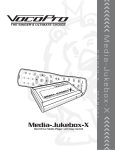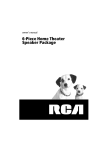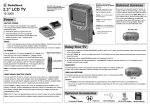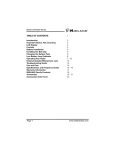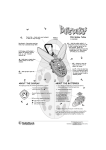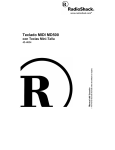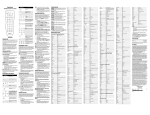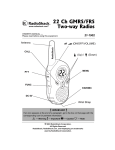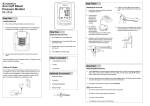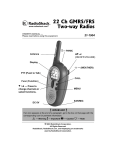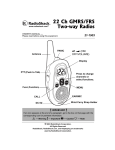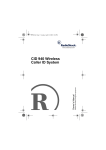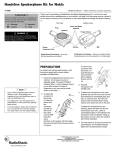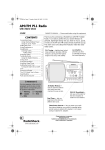Download Radio Shack 21-1864 User's Manual
Transcript
36"%JCPPGN"2GTUQPCN"(45"4/9C["4CFKQ
YKVJ"3WKGV"%QFG
21-1864
OWNER’S MANUAL — Please read before using this equipment.
%106'065
Preparation .................................................. 1
Installing Batteries .................................... 1
Recharging Ni-Cd or Ni-MH Batteries ...... 1
Using The Swivel Belt Clip .................... 2
Using An Optional Wrist Strap .............. 2
Operation .................................................... 2
Controls .................................................... 2
FRS Frequencies ..................................... 2
Using Key Lock ........................................ 2
Quiet Codes ............................................. 2
Quiet Code Chart ..................................... 2
Using Courtesy Tone ................................ 3
Setting The Key Tone ............................... 3
Setting The Vibration Alert ....................... 3
Using Voice Operated Transmission
(VOX) ....................................................... 3
Using the Backlight .................................... 3
Care ............................................................ 3
Service and Repair ...................................... 3
FCC Information .......................................... 4
Safety Information ....................................... 4
Specifications .............................................. 4
#"+/2146#06"#
Family Radio Service (FRS) is a licensefree, two-way, short-range voice radio
service that lets families and groups keep in
touch with each other on specific reserved
channels while providing clear
communication for up to two miles.
Your RadioShack 14 Channel Personal FRS
2-Way Radio is a lightweight, palm-sized
radio you can use to talk with another
person who has an FRS radio set to the
same frequency as your radio.
Your radio has auto-squelch, so you will not
hear anything on a channel unless someone
is transmitting nearby on the same channel.
You can use MON (monitor) to temporarily
turn off auto-squelch to hear weaker, distant
transmissions.
You can connect an optional speaker/
microphone and earphone to the radio
(neither supplied, available at your local
RadioShack store and online at
RadioShack.com).
Vibration Alert – vibrates
for 2 seconds when
receiving a signal if the
radio has been idle for
more than 30 seconds.
Voice Operated
Transmission (VOX) –
enables standalone
usage and works with a
handsfree accessory.
Channel Scan – use
to find other FRS
users.
38 Quiet Code –
eliminates interference
from other radios that
are not tuned to the
same channel and quiet
code as your radio.
Call Function — sends
a page to other FRS
radios set to the same
channel.
If an icon appears at the end of a paragraph,
go to the box on that page with the
corresponding icon for pertinent information.
Rý— Warning
# — Important
. — Caution
± — Note
+056#..+0)"$#66'4+'5
."%#76+10".
Installing Batteries
•
Use only fresh batteries of the required size
and recommended type.
•
Do not mix old and new batteries, different
types of batteries (alkaline or rechargeable), or
rechargeable batteries of different capacities.
•
If you do not plan to use the radio for a month
or longer, remove the batteries. Batteries can
leak chemicals that can destroy electronic
parts.
Recharging Ni-Cd or Ni-MH Batteries
•
•
You must use a Class 2 power source that
supplies regulated 6V DC (Not more than 6V)
and delivers at least 600mA. Its center tip must
be set to positive and its plug must fit the
radio’s DC 6V jack. Using an adapter that does
not meet these specifications could damage
the radio or the adapter.
Always connect the adapter to the radio before
you connect it to an external power source
(such as an AC outlet or a vehicle cigarettelighter socket). When you finish, disconnect
the adapter from the power source before you
disconnect it from the radio.
R
R
"9#40+0)ý
24'2#4#6+10
"
•
Never install non-rechargeable batteries when
CHARGE ON/OFF is set to ON. Nonrechargeable batteries can get hot or explode
if you try to recharge them.
•
Dispose of old batteries promptly and properly.
Do not burn or bury them.
Your radio requires four AAA alkaline or
rechargeable nickel-cadmium (Ni-Cd) /
nickel-metal hydride (Ni-MH) batteries (not
supplied) for power. For the best
performance and longest life, we
recommend RadioShack batteries..
1. Rotate VOL/OFF counterclockwise until
it clicks to turn off the radio.
2. Pull down the latch on the battery
compartment cover, then remove the
cover.
3. Slide CHARGE ON/OFF inside the
battery compartment to OFF (for
alkaline batteries) or ON (for Ni-Cd or
Ni-MH rechargeable batteries).
4. Install four AAA batteries according to
the polarity symbols (+ and –) marked
inside.
5. Replace the cover and push the latch
up until it clicks, then rotate VOL/OFF
clockwise until it clicks to turn on the
radio.
The battery icon segments on the display
show how much power remains. When È
flashes, replace the alkaline batteries or
recharge the Ni-Cd or Ni-MH batteries.
4'%*#4)+0)"0+/%&"14"0+//*"
$#66'4+'5
The radio’s DC 6V jack is for charging Ni-Cd
or Ni-MH batteries and powering the radio.
You can recharge Ni-Cd or Ni-MH batteries
inside the radio, using a 6V, 600mA AC or
DC adapter and a size F AdaptaplugTM
connector (neither supplied, both available
at RadioShack)..
ý
1. Rotate VOL/OFF fully counterclockwise
to turn off the radio.
2. Pull down the latch on the battery
compartment cover and remove the
cover.
3. Set CHARGE ON/OFF to ON.
R
4. Place four Ni-Cd or Ni-MH batteries in
the compartment according to the
polarity symbols (+ and –) marked
inside. Then replace the cover and push
the latch up until it clicks.
5. Attach the Adaptaplug to the adapter so
TIP reads positive (+).
6. Connect the Adaptaplug’s other end to
the radio’s DC 6V jack and plug the
adapter into a standard AC outlet or a
vehicle’s power source.
© 2002 RadioShack Corporation.
All Rights Reserved.
RadioShack and RadioShack.com are trademarks
used by RadioShack Corporation.
±"016'"±"
Recharging Ni-Cd or Ni-MH Batteries
•
•
Average charge time varies, depending on
capacity. Typically, Ni-MH batteries charge
in about 10 hours. Ni-Cd batteries charge in
approximately four hours.
You can use your radio while charging the
batteries if you employ a DC to DC
regulated and filtered adapter (such as
RadioShack catalog number 273-1859), but
not if you employ an AC to DC regulated
adapter (such as 273-1762).
Controls
•
•
If you hold down PTT over 2 minutes, the
radio automatically stops transmitting to
save power. The radio will generate an alert
tone and JN will flash on the display if you
continue to hold down PTT.
The radio automatically scans through quiet
codes while scanning through the channels.
The quiet code feature automatically turns
on when a signal is detected on a channel
and quiet code, and turns off after the signal
disappears. To stay on the active channel
and quiet code, press PTT to stop scanning
before the signal disappears.
Using Key Lock
When the keys are locked, you can still send a
page to other FRS radios set to the same
channel by holding down ¹ý/CALL, but you
cannot select a channel by pressing ¹ý/CALL.
#"+/2146#06"#
The EPA certified RBRC®
Battery Recycling Seal on the
nickel-cadmium (Ni-Cd) battery
indicates RadioShack is
voluntarily participating in an
industry program to collect and recycle these
batteries at the end of their useful life, when
taken out of service in the United States or
Canada. The RBRC program provides a
convenient alternative to placing used Ni-Cd
batteries into the trash or the municipal waste
stream, which may be illegal in your area.
Please call 1-800-THE-SHACK (1-800-8437422) for information on Ni-Cd battery recycling
and disposal bans/restrictions in your area.
RadioShack’s involvement in this program is
part of the company’s commitment to
preserving our environment and conserving our
natural resources.
Complete charging takes about 10 hours.±
When charging is complete, unplug the AC
or DC adapter from the power source, then
disconnect it from the radio’s DC 6V jack.#
75+0)"6*'"59+8'."$'.6"%.+2
Insert the swivel belt clip into the socket at
the back of the radio until it clicks. To
remove the clip, press the button at the top
of the belt clip and pull out the clip.
You can attach an optional wrist strap (not
supplied) to the radio. Slide the wrist strap’s
small loop under the bar at the top of the
radio. You might need to use a small
screwdriver or a straightened paper clip to
do this. Then pull the strap’s large loop
through the small loop.
12'4#6+10
%10641.5
37+'6"%1&'5
PTT – Hold down and speak into the
Quiet Codes lets you talk and listen to other
radios set to the same channel and quiet
code. This is like having a sub-channel
within a channel, giving you greater
communication flexibility. When you set a
quiet code and turn on this feature, you can
communicate with anyone who has a radio
set to the same channel and code.
microphone to transmit. TX appears.
Release to stop transmission.±
MON – Hold down to hear everything on a
channel, even weak transmissions. Release
to turn auto-squelch back on.
VOL/OFF – Rotate to turn the radio on and
off and adjust the volume.
¼ý/SCAN – Press to manually select a
channel. The selected channel number
appears. Hold down for about two seconds
to scan through the channels. The radio
automatically scans through the channels
and pauses on each active channel. To
restart scanning when the radio pauses on
an active channel, press ¼ý/SCAN again. To
stop scanning, press PTT.±
¹ý/CALL – Press to manually select a
channel. The selected channel number
appears. Hold down to send a page to other
FRS radios set to the same channel. JN
appears and the call tone sounds. After you
hold down ¹ý/CALL for about six seconds,
the tone stops.
(45"(4'37'0%+'5
1. Press QUIET/MENU until the quiet code
number flashes.
2. Repeatedly press ¼ý/SCAN or ¹ý/CALL
until you see the code number you want
to use. (See the “Quiet Code Chart” for
complete list of quiet codes).
3. Press PTT to store the code.
4. To turn off the quiet code feature, press
QUIET/MENU once. The quiet code
number disappears.
37+'6"%1&'"%*#46
%QFG
(TGSWGPE["**\+
1
67.0
2
71.9
3
74.4
4
77.0
%JCPPGN"%
(TGSWGPE["*/*\+
5
79.7
1
462.5625
6
82.5
2
462.5875
7
85.4
3
462.6125
8
88.5
4
462.6375
9
91.5
5
462.6625
10
94.8
6
462.6875
11
97.4
7
462.7125
12
100.0
8
467.5625
13
103.5
9
467.5875
14
107.2
10
467.6125
15
110.9
16
114.8
11
467.6375
12
467.6625
17
118.8
13
467.6875
18
123.0
14
467.7125
75+0)"-';".1%-
To lock or unlock ¼ý/SCAN, ¹ý/CALL and
QUIET/MENU, hold down MON then press
PTT. É appears when the keys are
locked.±
2
75+0)"#0"126+10#."94+56"564#2
19
127.3
20
131.8
21
136.5
22
141.3
23
146.2
24
151.4
25
156.7
%QFG
(TGSWGPE["**\+
26
162.2
27
167.9
28
173.8
29
179.9
30
186.2
31
192.8
32
203.5
33
210.7
34
218.1
35
225.7
36
233.6
37
241.8
38
250.3
75+0)"%1746'5;"610'
If the courtesy tone is on, 9#JED; appears
and the person you are communicating with
hears the courtesy tone when you finish
transmitting. Hold down QUIET/MENU until
9#JED; flashes. Ed or E<< appears.
Repeatedly press ¼ý/SCAN or ¹ý/CALL to
switch between the on and off settings.
Press PTT to store the setting, or the radio
stores the displayed setting after 15
seconds.
5'66+0)"6*'"-';"610'
You can set the radio so it sounds a tone
when you press any key except PTT or MON.
Hold down QUIET/MENU until 9#JED; flashes.
Repeatedly press QUIET/MENU until Ê
flashes. Ed or E<< appears. Press ¼ý/SCAN orý
¹ý/CALL to switch between the on and off
settings. Press PTT to store the setting, or
the radio stores the displayed setting after
15 seconds.
5'66+0)"6*'"8+$4#6+10"#.'46
You can set the radio to vibrate for two
seconds when a signal is received after the
radio has been idle for 30 seconds.±
Hold down QUIET/MENU until 9#JED; flashes.
Repeatedly press QUIET/MENU until Ù
flashes. Ed or E<< appears. Press ¼ý/SCAN or
¹ý/CALL to switch between the on and off
settings. Press PTT to store the setting, or
the radio stores the displayed setting after
15 seconds.
75+0)"81+%'"12'4#6'&"
64#05/+55+10"*81:+
Your radio has built-in Voice Operated
Transmission (VOX), which allows you to
transmit without holding down PTT, by
talking through the microphone or using
VOX accessories (available at your local
RadioShack store).
When you use a VOX accessory, turn off the
radio, then insert the VOX headset into the
radio’s earbud/mic jack and turn on the
radio. The VOX function activates
automatically, and LEN flashes. The
sensitivity level is automatically set to HI if
VOX is off before inserting the VOX
headset.
1. To adjust the sensitivity, hold down
QUIET/MENU until 9#JED; flashes, then
repeatedly press QUIET/MENU until LEN
flashes.±
2. Repeatedly press ¼ý/SCAN or ¹ý/CALL to
set VOX to >? for high sensitivity, or Be
for low sensitivity, or E<< to turn off VOX.
3. Press PTT or QUIET/MENU to store the
setting or it will store the displayed
setting after 15 seconds of no activity.
When VOX is activated, LEN flashes
periodically.
4. Speak into the microphone to transmit.
JN appears.
5. Press PTT to turn off VOX. LEN stops
flashing. Press PTT again to turn on
VOX. LEN flashes.
75+0)"6*'"$#%-.+)*6
Your radio’s display has a backlight that
turns on for approximately 10 seconds when
you press any key (except PTT when VOX is
disabled). To turn on the backlight without
changing any settings, press MON.±
%#4'
Keep the radio dry; if it gets wet, wipe it dry
immediately. Use and store the radio only in
normal temperature environments. Handle
the radio carefully; do not drop it. Keep the
5'48+%'"#0&"4'2#+4
If your radio is not performing as it should,
take it to your local RadioShack store for
assistance. Modifying or tampering with the
radio’s internal components can cause a
malfunction and might invalidate its warranty
and void your FCC authorization to operate
it.
radio away from dust and dirt, and wipe it
with a damp cloth occasionally to keep it
looking new.
±"016'"±"
Setting The Vibration Alert
When you turn on the radio, it vibrates, even if
the vibration alert is off.
Using Voice Operated Transmission
(VOX)
•
The VOX sensitivity levels (Hi or Lo) allow
you to compensate for background noise.
This minimizes the chance of unintended
sounds making a transmission.
•
VOX is disabled while you are receiving a
transmission.
Using the Backlight
You cannot turn on the backlight while the
radio is receiving a signal.
Limited Ninety-Day Warranty
This product is warranted by RadioShack against
manufacturing defects in material and workmanship
under normal use for ninety (90) days from the date
of purchase from RadioShack company-owned
stores and authorized RadioShack franchisees and
dealers. EXCEPT AS PROVIDED HEREIN, RadioShack MAKES NO EXPRESS WARRANTIES
AND ANY IMPLIED WARRANTIES, INCLUDING
THOSE OF MERCHANTABILITY AND FITNESS
FOR A PARTICULAR PURPOSE, ARE LIMITED IN
DURATION TO THE DURATION OF THE WRITTEN
LIMITED
WARRANTIES
CONTAINED
HEREIN. EXCEPT AS PROVIDED HEREIN, RadioShack SHALL HAVE NO LIABILITY OR RESPONSIBILITY TO CUSTOMER OR ANY OTHER
PERSON OR ENTITY WITH RESPECT TO ANY LIABILITY, LOSS OR DAMAGE CAUSED DIRECTLY
OR INDIRECTLY BY USE OR PERFORMANCE OF
THE PRODUCT OR ARISING OUT OF ANY
BREACH OF THIS WARRANTY, INCLUDING, BUT
NOT LIMITED TO, ANY DAMAGES RESULTING
FROM INCONVENIENCE, LOSS OF TIME, DATA,
PROPERTY, REVENUE, OR PROFIT OR ANY INDIRECT, SPECIAL, INCIDENTAL, OR CONSEQUENTIAL DAMAGES, EVEN IF RadioShack HAS
BEEN ADVISED OF THE POSSIBILITY OF SUCH
DAMAGES.
Some states do not allow limitations on how long an
implied warranty lasts or the exclusion or limitation
of incidental or consequential damages, so the
above limitations or exclusions may not apply to
you.
In the event of a product defect during the warranty
period, take the product and the RadioShack sales
receipt as proof of purchase date to any RadioShack store. RadioShack will, at its option, unless otherwise provided by law: (a) correct the
defect by product repair without charge for parts and
labor; (b) replace the product with one of the same
or similar design; or (c) refund the purchase price.
All replaced parts and products, and products on
which a refund is made, become the property of RadioShack. New or reconditioned parts and products
may be used in the performance of warranty service. Repaired or replaced parts and products are
warranted for the remainder of the original warranty
period. You will be charged for repair or replacement of the product made after the expiration of the
warranty period.
This warranty does not cover: (a) damage or failure
caused by or attributable to acts of God, abuse, accident, misuse, improper or abnormal usage, failure
to follow instructions, improper installation or maintenance, alteration, lightning or other incidence of
excess voltage or current; (b) any repairs other than
those provided by a RadioShack Authorized Service
Facility; (c) consumables such as fuses or batteries;
(d) cosmetic damage; (e) transportation, shipping or
insurance costs; or (f) costs of product removal, installation, set-up service adjustment or reinstallation.
This warranty gives you specific legal rights, and
you may also have other rights which vary from
state to state.
RadioShack Customer Relations, 200 Taylor Street,
6th Floor, Fort Worth, TX 76102
12/99
3
(%%"+0(14/#6+10
To be safe:
#"+/2146#06"#
Do not open your radio to make any internal
adjustments. Your radio is set up to transmit a
regulated signal on one of 14 assigned
frequencies. It is illegal to alter or adjust the
settings inside the radio to exceed those
limitations. Any adjustments to your radio must
be made by a qualified technician using the
proper test equipment.
• Never open your radio’s case.#
• Never change or replace anything in
your radio except the batteries.
Your radio might cause TV or radio
interference even when it is operating
properly. To determine whether your radio is
causing the interference, turn it off. If the
interference goes away, your radio is
causing it. Try to eliminate the interference
by:
• Moving your radio away from the
receiver.
• Calling your local RadioShack store for
help.
If you cannot eliminate the interference, the
FCC requires that you stop using the radio.
This device complies with Part15 of the FCC
Rules. Operation is subject to the following
two conditions: (1) This device may not
cause harmful interference, and (2) this
device must accept any interference
received, including interference that may
cause undesired operation.
This equipment has been tested and found
to comply with the limits for a Class B digital
device, pursuant to Part 15 of the FCC
Rules. These limits are designed to provide
reasonable protection against harmful
interference in a residential installation. This
equipment generates, uses and can radiate
radio frequency energy and, if not installed
and used in accordance with the
instructions, may cause harmful interference
to radio communications.
However, there is no guarantee that
interference will not occur in a particular
installation. If this equipment does cause
harmful interference to radio or television
reception, which can be determined by
turning the equipment off and on, the user is
encouraged to try to correct the interference
by one or more of the following measures:
Reorient or relocate the receiving antenna.
Increase the separation between the
equipment and receiver.
Connect the equipment into an outlet on a
circuit different from that to which the
receiver is needed.
Consult the dealer or an experienced radio/
TV technician for help.
5#('6;"+0(14/#6+10
."%#76+10".
•
•
To maintain compliance with the FCC’s RF
exposure guidelines, hold the transmitter
and antenna at least 2 inches (5 cm) from
your face and speak in a normal voice, with
the antenna pointed up and away from your
face. If you wear the handset on your body
while using the headset accessory, use only
the supplied belt clip for this product and
when transmitting, take it out of the belt to
ensure the antenna is at least 1 inch
(2.5cm) from your body.
Use only the supplied antenna.
Unauthorized antennas, modifications, or
attachments could damage the transmitter
and may violate FCC regulations.
RadioShack Corporation
Fort Worth, Texas 76102
Your wireless handheld portable transceiver
contains a low power transmitter. When the
Push-To-Talk (PTT) button is pressed, it
sends out radio frequency signals. The
device is authorized to operate at a duty
factor not to exceed fifty percent. In August
1996, the Federal Communications
Commission adopted RF exposure
guidelines with safety levels for handheld
wireless devices..
52'%+(+%#6+105
Frequency Range ...............................................................................................462.5625 – 467.7125MHz
Channels .................................................................................................................................................. 14
RF Output Power .......................................................................................................... 400 – 500mW ERP
Power Supply ................................................................................................... 6.0 VDC (4 × AAA Alkaline)
Battery Life ...................................................................................................... 20 hours (alkaline batteries)
Operation Temperature..................................................................................... –4 to 122 ºF (–20 to 50 ºC)
Dimension (HWD) ............................................................................ 41/2 × 23/8 × 11/3 in (115 x 61 × 34mm)
Weight..................................................................................................................................... 5.1 oz (148g)
Specifications are typical; individual units might vary. Specifications are subject to change and
improvement without notice.
21-1864
AO0108AAA1
07A02
Printed in China





